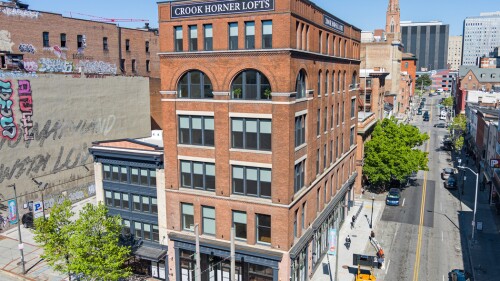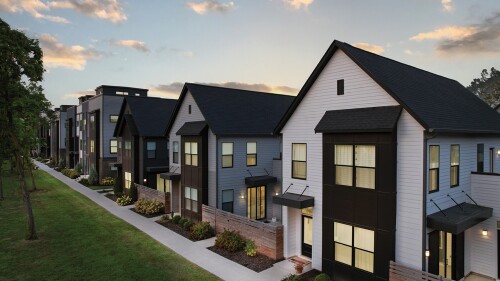Ada County, Idaho, can revitalize the 247-acre (100 ha) historic Expo Idaho site by preserving and expanding unique natural resources, celebrating the area’s agricultural heritage, and embracing complementary uses for the space, according to a report released by ULI.
The report is based on recommendations from a panel of land use and resilience experts convened in June through the Institute’s Virtual Advisory Services Panel (vASP) offering. The virtual panel is a multi-day program that is tailored to meet a community’s specific needs, wherein ULI representatives hold in-depth interviews with local stakeholders and deliberate on potential courses of action and best practices before making a final presentation of their recommendations.
The panel was charged with analyzing the feasibility and economic impact of three community-informed redevelopment scenarios for Expo Idaho: updating fairground facilities and creating outdoor education and agricultural heritage areas; a sports stadium and events venue supported by retail and recreation amenities; and a town center mixed-use development with housing and retail. The scenarios had been initially proposed by the Expo Idaho Citizens Advisory Committee, for consideration by the Ada County Board of Commissioners, following a yearlong process that included public engagement.
The panel assessed the three scenarios and recommended a fourth to illustrate how Expo Idaho could accommodate a variety of uses with long-term growth in mind while generating significant public benefit for Ada County and the larger Treasure Valley region. The report summarizes the panel’s key recommendations:
- Think Big: Plan the redevelopment of Expo Idaho with its legacy 50 years from now in mind. The site has the potential to serve a variety of uses desired by the community.
- Make Incremental Change: Commissioners do not need to resolve all questions about the site at once. They can make initial decisions that reflect the existing consensus about the site, such as the desire to preserve the Western Idaho fair and increase public green space, while planning for a cohesive vision for the site.
- Build on Existing Assets and Natural Space: Expand the existing natural space and sports and recreational areas while updating existing buildings and parking and considering future mixed-use development.
- Get Started on Keystone Projects: Move Lady Bird Park adjacent to the Boise River to unlock new opportunities for redevelopment. This step has the momentum of public opinion behind it.
- Establish Long Term Project Champions: An entity with consistent, long-term oversight over the redevelopment process is essential to the project’s success, regardless of the eventual masterplan for the space.
- Prioritize Public Benefit: Keep community benefit at the forefront of the site’s decision-making process. Bringing people together to connect as a community and creating a sense of place will ensure the project’s success.
- Build Partnerships for Financial Stability: By investing in the site and incorporating it into its portfolio of assets, Ada County can generate more revenue for the county and increase the public benefit of the site. Multiple funding sources are available to fund development, including leveraging private funding and creative partnerships.
The panel was chaired by Sarah Sieloff, senior planner, Maul Foster Alongi, Bellingham, Wash. “Our recommendations to the county were guided by the maxim ‘Preserve. Celebrate. Connect.’ Redeveloping Expo Idaho presents a generational opportunity and demands careful consideration and a big vision,” Sieloff said. “There is enough acreage to provide a variety of uses for a diverse and growing community. Now is the time for ‘and’ — not ‘or’ — thinking.”
Sieloff was joined on the panel by David Armitage, director of asset management, Heartland, Seattle, Wash.; Cielo Castro, chief of staff, Fairplex, Pomona, Calif.; Nick Duerksen, economic development director, Sandy City, Sandy, Utah; Peter McEneaney, vice president, Thor Equities, New York, N.Y.; Stacey Mosely, director of research, Brandywine Realty Trust, Philadelphia, Penn.; Stephanie Pankiewicz, partner, Land Design, Alexandria, Va.; and Nicolia Robinson, associate principal, Cooper Carry, Atlanta, Ga.
This panel is a virtual Advisory Services panel (vASP), a technical assistance product created as a response to continuing ULI’s mission of creating vibrant, sustainable communities during the COVID-19 pandemic. The vASP is a 3.5-day panel that convenes a multi-disciplinary panel of experts from across the United States who possess a range of professional backgrounds and use their collective skills to meet the needs of an identified land use or policy challenge.
Since 1947, the ULI Advisory Services Program assembles experts in the fields of real estate and land use planning to participate on panels worldwide, offering recommendations for complex planning and development projects, programs and policies. Panels have developed more than 700 studies for a broad range of land uses.
According to Thomas Eitler, senior vice president of ULI’s advisory services program, the strength of the program lies in ULI’s unique ability to draw on the substantial knowledge of its 45,000-plus members, including land developers, engineers, public officials, academics, lenders, architects, planners and urban designers. “The independent views of the panelists bring a fresh perspective to the land use challenge,” Eitler said. “The Advisory Services program is all about offering creative, innovative approaches to community building.”
The Ada County, Idaho, virtual Advisory Services Panel report can be found on ULI’s Knowledge Finder platform.





